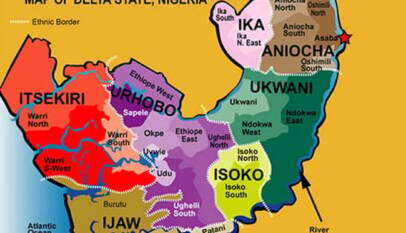Nestlé Dairy Centre: The quiet revolution brewing in Paikon Kore rural community
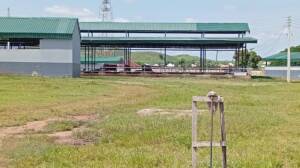
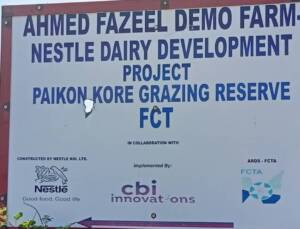
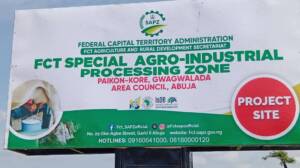
In the remote folds of Paikon Kore Community, nestled within Gwagwalada Area Council of Nigeria’s Federal Capital Territory, investigative journalist Stanley Ihedigbo uncovered signs of a quiet revolution. What began as a routine visit turned into a revealing journey through the subtle yet profound changes reshaping rural Abuja. From grassroots innovations to unexpected shifts in local livelihoods.
Once known for its sparse population and subsistence farming, Paikon is now buzzing with activity, trucks moving in and out, herders bringing fresh milk at dawn, and construction workers busy on newly graded roads.
At the centre of this change is the Nestlé Dairy Demonstration Farm and Agro Processing Centre. This project is not only redefining modern dairy farming but also opening doors for investment, employment, and community development.
The once-quiet Paikon Kore community in the Gwagwalada Area Council of the Federal Capital Territory (FCT) is fast becoming a centre of economic activity, thanks to the presence of the Nestlé Dairy Demonstration Farm and Agro Processing Centre.
The initiative, anchored by Nestlé Nigeria Plc in partnership with CBI Innovation, is changing the face of rural development through modern dairy farming and job creation.
Speaking with our correspondent, Mr Adam Shaiuba, one of the coordinators at the centre, described the project as a factory-based milk collection and processing operation that has created employment for thousands of people within and around Paikon.
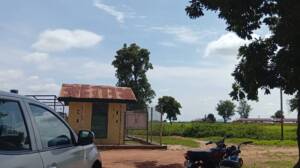
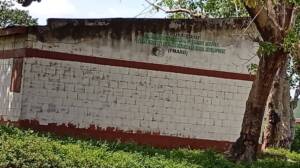
“It is a factory production setup, and mostly off-takers come to collect the milk,” he explained. “Nestlé Nigeria invested in this agro-processing centre, which serves as a demonstration farm for dairy production. The centre has provided jobs for thousands of people across the area.”
Every morning, dozens of Fulani herders and local farmers bring fresh milk to the centre. On average, one person can deliver over 20 litres of milk per day, which is then processed, preserved, and stored in a cooling facility capable of holding more than 3,000 litres of milk until off-takers arrive.
“Many companies come to collect milk from here,” Shaiuba said. “Nestlé alone manages over 400 cattle, while other private farms also keep herds and supply milk. The cows are well-connected to the market chain.”
Among the notable breeds at the centre is the Jersey cow, known for its rich, creamy milk and gentle temperament.
These cows produce up to 10 litres of milk per day, far more than local breeds that yield between two and four litres daily.
The Jersey breed is also well adapted to Nigeria’s high temperatures, making it ideal for sustainable dairy farming.
During a recent visit to the site, Dr Mole Olatunji, Project Director of the FCT Special Agro-Processing Zone Project, accompanied by a team of investors, stated that they were on a fact-finding mission as part of preparations for a major agro-industrial investment in the area.
He explained that the Special Agro-Processing Zone (SAPZ) project is a collaborative effort between the Federal Government, the FCT Administration, and development partners such as the Islamic Development Bank (IsDB), to promote livestock and dairy value chains.
“We are here to understand the current state of operations and community involvement before the new project takes off,” Dr Olatunji said.
“We plan to establish an Agro-Industrial Hub on 518 acres of land in Paikon, focusing on the processing of crops and livestock products.”
The proposed industrial hub will feature facilities for processing milk into powdered milk, liquid milk, and yoghurt, as well as an abattoir for meat processing.
Local entrepreneurs and food processors will also be able to participate in value addition through small-scale businesses.
“This project will attract investors from within and outside Nigeria,” Dr Olatunji continued. “It’s designed as a win-win for everyone: farmers, herders, processors, and the community.”
He added that the project would also include an Agricultural Transformation Centre to support smallholder farmers in boosting productivity.
“Those whose cows currently produce one litre of milk per day will be supported to reach 20 litres,” he said.
“Crop farmers will also receive training and inputs to raise yields from one ton per hectare to as much as 3.5 tons. There will be access to funding, improved infrastructure, and capacity-building opportunities.”
According to Dr Olatunji, the project is expected to provide jobs, schools, hospitals, and modern amenities that will make Paikon comparable to urban settlements.
Community Inclusion and Sustainability
On concerns about land acquisition and displacement, Dr Olatunji assured that the project adheres to international standards of environmental and social responsibility.
“In every intervention project, those affected are always taken into account,” he said.
“We have what we call the Environmental and Social Impact Plan, which outlines what will be done for each affected person to ensure fairness and compensation.”
He also emphasised that training and knowledge transfer are key parts of the project.
“We start by training group leaders, who then train their members and other farmers,” he explained.
“For example, if someone sees his neighbour harvesting five cobs of maize instead of one, he will naturally want to learn how. This peer-to-peer training helps knowledge spread quickly and sustainably.”
With the combined efforts of Nestlé Nigeria, CBI, and the Federal Government’s Special Agro-Processing Zone initiative, Paikon is poised to become a major agricultural and investment hub in the FCT.
Earlier in the year, when Nestlé’s dairy demonstration farm was launched as part of the Nestlé Nigeria Livestock Development Project (NLDP), which began in 2021 and was designed to improve the productivity of local dairy farmers through better breeding, feed, and community resilience.
Speaking at the launching ceremony, the Managing Director and CEO of Nestlé Nigeria, Wassim Elhusseini, explained the company’s investment in the project.
He noted that since 2019, Nestlé Nigeria has invested over N1.8bn in improving the livelihoods of pastoralists around the Paikon Kore grazing reserve.
“We are happy to report that the milk producers in this program have seen a substantial increase in their household income, rising from N70,000 in 2021 to N250,000 in 2024,” Elhusseini said.
The growth, he added, was driven by improved dairy practices and infrastructure within the communities.
One of the partners, CEO of CBI Innovations, Soji Apampa, expressed enthusiasm about the future impact of the demonstration farm.
The Minister of Livestock Development, Alhaji Idi Mukhtar Maiha, commended Nestlé’s commitment to the nation’s backward integration goals. “This model dairy farm aligns with our national agenda for livestock development.
“By introducing modern farming practices and supporting local dairy farmers, this project will help reduce reliance on imports and strengthen the economy,” he said.
Some community members also expressed excitement about the farm’s potential benefits.
The Nestlé Dairy Development Farm spans four hectares within the Paikon Kore Grazing Reserve and is equipped with cattle sheds, a calf pen, a maternity and sick bay, automated milking systems, and sustainable infrastructure like solar power and biogas for waste management.
It will serve as a training hub for farmers, academics, and other stakeholders in the dairy sector.
The ongoing construction of access roads and the growth of the dairy and livestock sector have already begun to change the face of the community, bringing development, jobs, and hope for a brighter future.
As Paikon’s residents watch milk flow daily from the lush fields into the cooling tanks of the Nestlé Dairy Centre, they also witness the flow of opportunities that promise to redefine rural life in Nigeria’s capital territory
FirstBank ignites Global Kindness: 2025 CR&S week kicks off
FirstBank, the premier bank in West Africa and a leading financial inclusion service provi…



